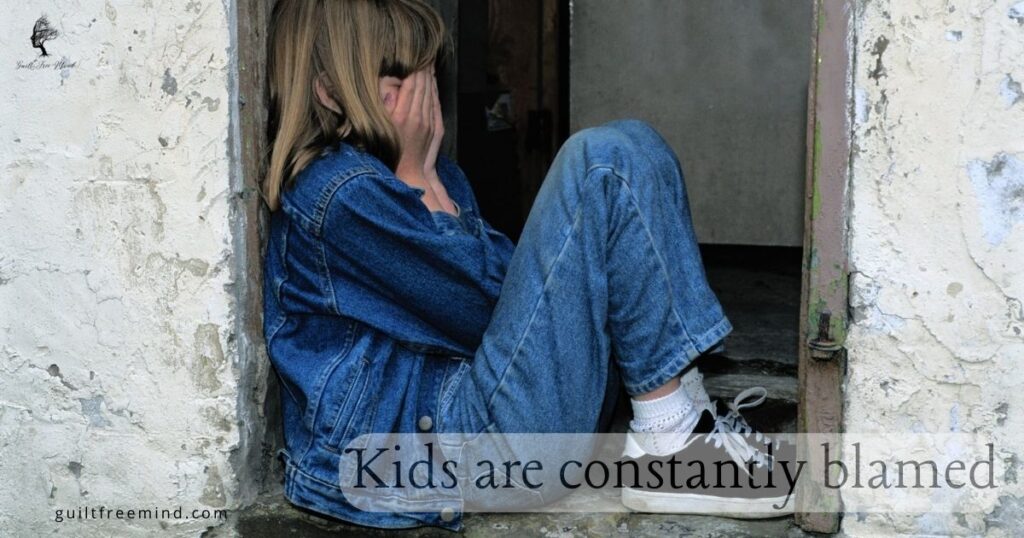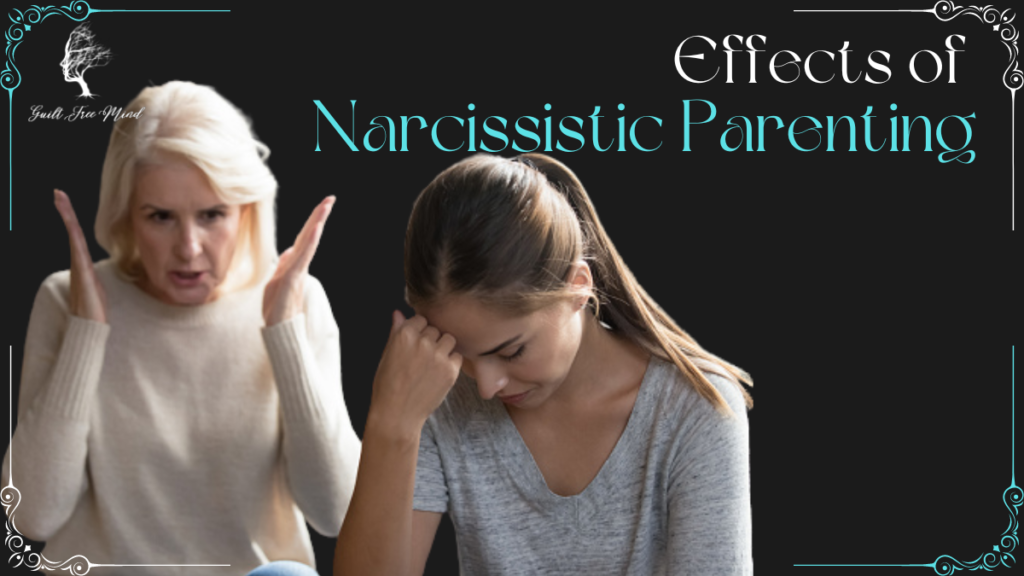In my previous blog posts, I have discussed what is a narcissistic personality disorder and the signs that a child has been raised by narcissistic parents. In this article, I’ll discuss the effects that narcissistic parenting can have on the child.
Every parent influences who their child is going to grow up to be. If the parent is a narcissist or a psychopath, the child learns attributes that would be different if the child had parents who are neither. However, before I get into the effect of narcissistic parenting on children, you need to understand what a narcissist truly is
Table of Contents
Narcissism personality disorder
In the narcissist’s mind, they are the most crucial person in the world. Narcissists love attention and will do anything to get it. Most people think that narcissism is being arrogant, boastful, and talking about themselves. These traits can definitely be annoying. However, these are not the traits that define narcissism. Narcissism is a much deeper and more destructive disorder. It can have devastating effects on the person who’s in a relationship with a narcissist.

It does not matter who the narcissist is hurting. As long as they have attention, they are happy. They are experts at blaming others for their own faults. They never accept their own mistakes. Narcissists share a few characteristics with psychopaths, the lack of empathy being one of the primary ones. Some studies have shown that narcissism can be treated. However, it is a difficult disorder to cure completely.
The child who has grown up under narcissistic parenting
A child of such a parent can have a very hard time growing up and may develop attributes that are different than what society has deemed normal. This is because the child never had a normal childhood in the first place. Many kids raised under narcissistic parents feel touched out. They do not like to be touched, even by their own parents. This is primarily because of the constant need of the narcissist to crave attention from any and everyone. Narcissists also do not have the ability to empathize. They don’t care about how their kids feel at any point in time. This can severely stunt the emotional growth of the child.
How narcissistic parents view their children?
Narcissistic parents rely heavily on their children for their own needs. They view their kids as an extension of themselves. Their child’s sole purpose of existence is to fulfill the wishes of the narcissistic parent. The child never learns how it feels to be loved or receive affection from the parent. He is constantly stuck in a state of no self-esteem, sadness, and anxiety.
The one thing that the child learns very early is that to survive; they have to please others, especially their parents. Therefore, these children learn to do everything that their parents ask without question. They never say no to any requests. Narcissists do not understand the concept of limits and boundaries when it comes to their own kids. They may overshare as well. Therefore, these kids grow up not knowing when to say STOP to the other person or when to stop themselves from crossing boundaries with others.

Understanding narcissistic parenting
How the parents treat their kids is what plays a fundamental role in the psychological and physical development of the child. According to studies, it has been observed that maternal and paternal psychological control has a larger influence compared to the influence of environmental factors. Parents who are victims of narcissistic personality disorder can severely impair the development of their children.
Effect of narcissistic parenting on kids
Narcissistic parenting can have a huge effect on the child. As I mentioned before, I can severely stunt the emotional growth of the child. The child may not learn to associate with others or with the world in a normal manner. Most often, such children feel that as long as they do things beneficial for others, they will be appreciated. Otherwise, they are worthless. Narcissistic parenting can have many detrimental effects on their kids. Some of them will be discussed in the following points. However, I should mention that it is not necessary that every narcissistic parent will display all of these characteristics. These traits can either be exhibited in subtle manners or can take another form. Every person is different. Therefore, the expression of traits can be different in every person.
A complete lack of empathy.
No matter what, such parents cannot imagine what their child is going through. They only see their own problems. They are incapable of understanding that their child may have problems and need the parent to be present for their emotional support. Such parents are experts at putting their own needs before that of their kids. This is primarily because of their self-centered and selfish nature. They fail to understand that the child also has feelings. All they can see is their own need.
Possessiveness
Narcissistic parents have a very hard time letting their kids go. They know their kids as their own extensions. According to narcissistic parents, their child’s only purpose is to help them. If the child is not helping the parents, what is the purpose of having a child? This is how narcissistic parenting works. This is also the reason why they do not want their kids to be independent. Once a kid becomes independent, there is a high likelihood that the child will leave the parent. Their dependency on their kid is so much that they don’t want their child to ever be independent. They also emotionally manipulate the kids so that the kids listen to them and follow every instruction of the parent.
Constant blame
Narcissists are extremely good at blaming others for their own problems. If they have a problem in their life, they will blame the child for that. If they have to work, they will believe that it’s the fault of the child. They may say things like,
“You are the reason I have to work so hard. I have to provide for you, and this puts extra pressure on me.”
“What is your purpose? You should have reminded me of the meds I was supposed to take. It is because of you that I did not take medicines and now I am going to be sick.”
“You can see that I am sick. Can you not book a doctor’s appointment for me and take me? You are such a worthless child.”
“You should be grateful that I am cooking for you. There are so many kids who cook for their parents. You should also learn and help out.”

A constant feeling of not being heard
Narcissists only keep track of their kids to have their own wishes fulfilled. They don’t care about how their child feels or what their child is going through emotionally. Therefore, such kids may feel that they are not heard or just don’t exist for others. They exist only when their parents want something. Otherwise, their parents don’t care for them.
This happens because the parent does not have the emotional capacity to connect with the child. As I mentioned before, the child is seen as an extension of the narcissistic parent and is used to benefit the parent. When the parent has no task they want to be done, they will behave as if the child does not exist. Such kids learn survival and self-dependency from a very early age because they have to be an emotional and physical crutch for their parents.
No recognition
It does not matter whether the child comes first in every subject. Narcissistic parents always want all accolades for themselves. Therefore, they may try to take down the self-confidence of the child. They may say, “Why did you not get 100% marks? You made such silly mistakes.”.
If the parent is sick and the child is taking care of the parent, the parent may say, “if you had noticed my symptoms sooner I would not be so sick right now.”
If the parent is performing poorly at their job: “You are the reason I don’t do well in my job. I am always busy taking care of you”.
These factors negatively impact the self-esteem of the child. Since these factors are present from childhood, the child goes up thinking that he is a burden on others and that maybe it would be better if he had never been born. The presence of a constant demotivating environment around the child makes it very difficult for the kid to boost his own self-esteem and feel that he can do something in his life.
No confidence in their own emotions
In narcissistic parenting, if the child even tries to connect with the parents, he will be shut down. Narcissistic parents are extremely good at devaluing the emotions of the child. If the child is crying, the narcissist may react as the following:
“Why are you making such a big show of your emotions.”
“Oh! So, you can cry now! I cannot even scold you for anything. You have crying in your arsenal.”
“The water dams are going to open and tears will flood out the moment I say something that you don’t like to hear”.
Because of these spikes-filled sentences from the parent, the child learns not to trust their own emotions. Kids are like wet molds of clay. They can be molded into whatever shape the parent desires. When the parents start devaluing the emotions of the child, the child feels confused. Eventually, this causes the generation of personal insecurities in the child. The kid feels that his emotions are wrong and he is not supposed to feel the way he is feeling.
Difficulty understanding their own self
Since the kids are always treated as commodities in narcissistic parenting, they don’t really learn to see themselves as people. They feel that they are only there for others. For example, narcissists hate feeling alone. They may use the child as a means to escape boredom. However, they will never empathize or even try to understand what the child might be feeling.
Therefore, the child never develops a sense of self. Children rely on the mother or the father to tell them how they should feel at a certain point. These factors are expertly used by narcissists to manipulate the child’s feelings in favor of their own self. They want the child to be dependent coz this favors their goal. The child may depend on the parents to the point that he needs the parents to tell him what kind of a person he is. The constant manipulation does not help either.
Children learn that they are valued for what they can do.
The one thing that narcissists know very well is how to manipulate others. This is a factor that narcissists and psychopaths share in common. They are very good at manipulating and shifting the blame. If a child has been brought up under narcissistic parenting, he may start to feel that he will only be valued by his friends or society if he does something for them. The value gets associated with how much you can do for others. They feel that if they are not beneficial to others, they will never have friends or a support system.

This way, the child is constantly afraid of being their true self. They also find it difficult to
- connect with their own self
- figure out who they are
- What do they like or dislike
Constant demotivation
The one thing that the narcissist cares about more than anything else is being in the limelight. Since the child is an extension of the parent, the parent will ask the child to perform well so that the parent can receive accolades from society. However, if the parent notices that the child may outshine the parent, they will demotivate and bring down the self-confidence of the child. Such parents may also manipulate the child so that the child feels that he is not good at the task. The purpose of narcissists is to be praised for everything that they or their kids do. They want to be known as good parents. However, they don’t want their child to receive more accolades than themselves.
Social relationships and attachment styles
Kids under narcissistic parenting grow up in an environment where they do not have good role models or reference figures. They have severely impaired emotional growth. All they feel is that as long as they are useful to others, they will have friends and relationships. The day they stop being useful to others, the relationships and friendships will all go away. Their bonding and attachment style is negatively affected because of narcissistic parenting. This has severe repercussions on their relationships and social life. Such kids most often develop an attachment to others but are often insecure in their relationships. They feel that the day they stop being useful to the other person, the relationship will end. Due to this, their insecurity is always at a peak level.
Self-esteem damage
In narcissistic parenting, the parent will always make their child feel that they are not good enough. As I mentioned before, even if the child gets above 90% in school, the parent will ask for 100% scores. The child always feels that no matter what he does, he will never be good enough. They will never be successful in their own life.

Effect on the development of the brain
Narcissistic parenting not only affects the psychological side of the child, but it also affects brain development. Studies have observed that such kids have variations in the gray matter volume in their brains. They also have a smaller hippocampus. This is particularly associated with the high-stress load that they have been suffering through for years.
Long-term damage caused by a narcissistic mother
Unfortunately, having narcissistic parents is more common than you may have noticed. Since the primary parent of the child is a narcissist, the child suffers through a complete lack of any emotional ties from the parent. The narcissistic mother only cares about what her kids can do for her. Such kids grow up to believe that they are only good for others if they can do something for them. They learn to neglect their own needs to satisfy the needs of everyone else around them. This is the only way they have learned to gain affection from others. If they don’t do things for others, they are worthless.
As a child, such kids were made to feel like a burden because they weren’t able to fulfill the needs of their parents. Narcissists expect the child to be:
- Present for the parents all the time
- Be there for their parents emotional support
- Be their physical support
- Get groceries
- Do the household chores
- Tell the parents to take medicines if needed etc.
Anything that goes wrong in the parent’s life is blamed on the child. Thus, the child learns that the best thing to do is to fulfill all of the parent’s wishes. They start putting their parents first and their own needs second. Eventually, the child grows up with an understanding that in this world, you have to please others to be accepted or get affection in return.
Can such parents overcome their narcissistic tendencies?
If you are a child of a narcissistic parent, I would suggest you seek counseling and therapy as soon as possible. Narcissism affects you in ways you may not even realize. Such children have an emotionally abusive childhood, along with distorted promises, vows, and sarcasm that have affected the way they think and process feelings. If you need assistance with managing the emotional wounds inflicted on you as a child, you should get in touch with a therapist.
Another reason why you should opt for counseling is that narcissism can increase. As a child of narcissistic parents, when you grow up, there is a high chance that you may start displaying similar traits to your parents, like a lack of empathy, self-absorption, entitlement, and a constant need for admiration. This is because you grew up in an environment where these traits were at peak levels.
It has also been observed that kids who have been exposed to over-evaluation, overparenting, or maltreatment during their growth years are more likely to exhibit a trait of narcissism when they grow up.
What to do if you suffer from narcissistic parenting?
The first thing that you must do once you realize that you have been brought up under narcissistic parenting is to separate yourself from your parents. Do this as soon as possible. If you are financially dependent on them, I suggest getting a job and shifting houses. You need to put some physical distance between you and your parents. You must also learn how to put boundaries and define personal space.
They are your parents. They have given birth to you. However, this does not mean that you owe your life to them. You have your own life to take care of. No matter how much you love your parents, these traits are toxic and can negatively impact or even ruin your adult life. Therefore, separating yourself and putting distance as soon as possible is the only option.

I understand that this task will not be easy. Lean on the other members of your family, friends, and people in your close circle and ask them for help. If you are struggling with your sense of identity or self-esteem, boundaries, etc., you can get help from a psychologist. You may not realize it right away, but having narcissistic parents can influence you in many negative ways. The first step in getting better is accepting that your childhood has been less than ideal. The second step is to seek professional help. This way, you can put your life back in order as soon as possible.
Conclusion
In narcissistic parenting, parents believe that their children are an extension of themselves. According to them, their child has only one purpose in life, which is to fulfill their own wishes. Their child is not allowed to have a life or personal space of their own. Narcissists are extremely afraid of losing the control they have over their children and will employ techniques of manipulation, gaslighting, etc. to keep their children in their clutches. If you are a child of such a parent, I suggest getting help as soon as possible. Distance yourself from your parent and approach a mental health professional.
Do you want to know more about narcissistic parenting and other questionable parenting styles? If yes, then subscribe to the Guilt Free Mind. Your subscription will allow me to notify you the moment the next blog post is released. This way, you will stay updated with all the latest tips and tricks on how to lead a positive life and keep negativity away. If you have any queries about this blog post or any other, you can reach me live on Twitch. I do coworking streams every day From 11 AM to 7 PM IST. I also host mental health streams on Tuesdays and Fridays from 4:30 to 6:30 PM. If you like watching videos, you can subscribe to the YouTube channel of Guilt Free Mind. Do not forget to ring the notification well.
See you in my next blog post

1 Comment
Reading your article helped me a lot and I agree with you. But I still have some doubts, can you clarify for me? I’ll keep an eye out for your answers.